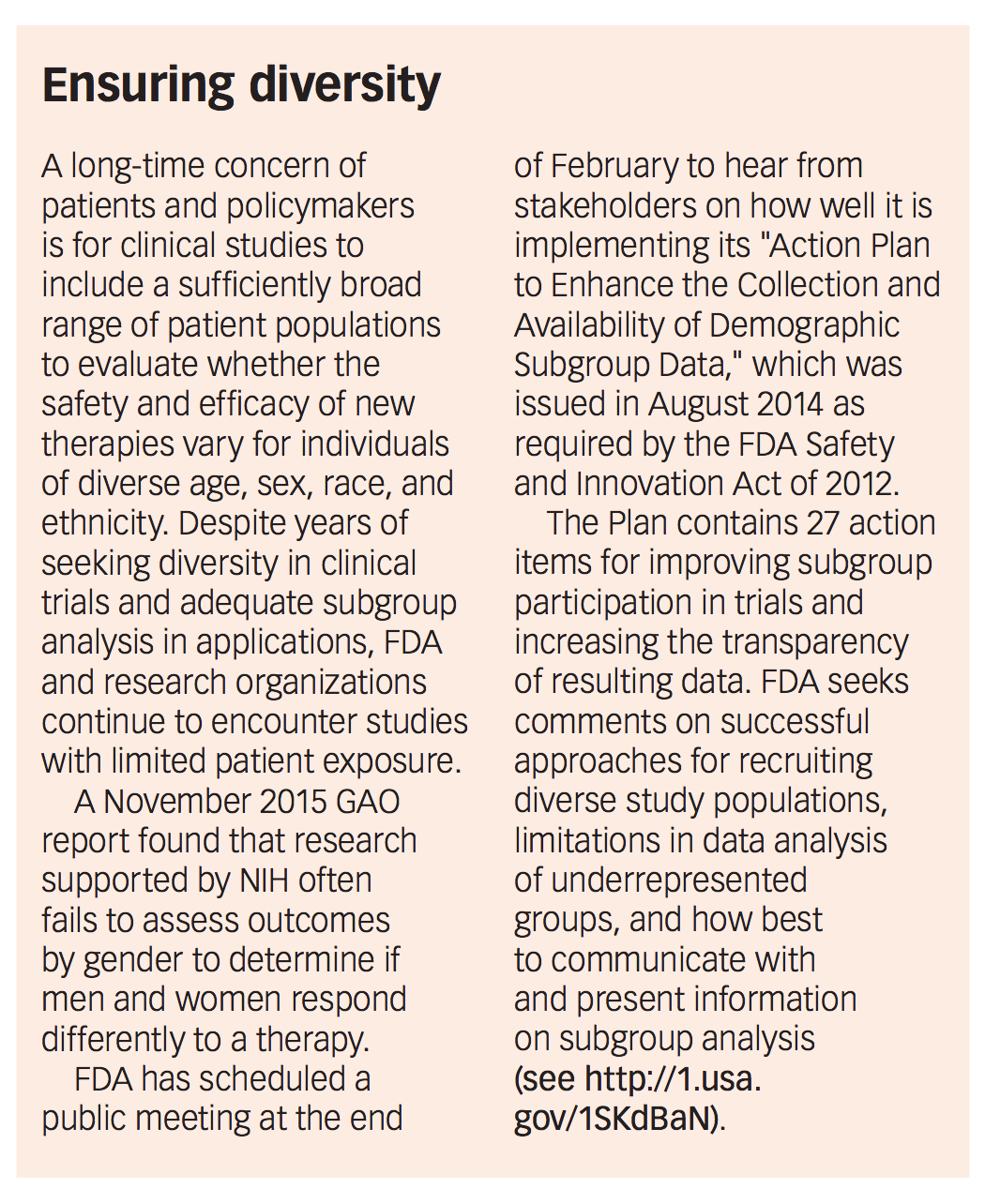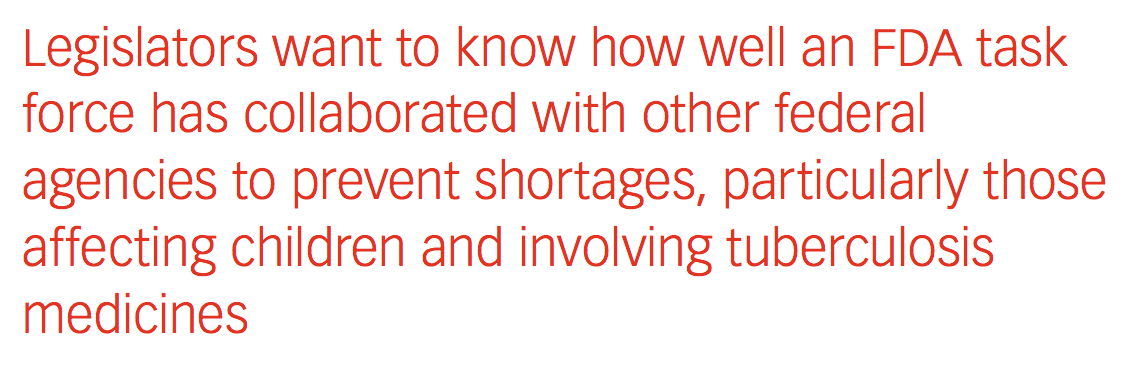Congress to Keep a Close Watch on FDA
Pharmaceutical Executive
More oversight of regulatory programs and policies planned by GOP critics.
While complaints about too-high drug prices will remain a hot topic on Capitol Hill, the legislators also will address a range of regulatory issues related to ensuring the safety, quality, and timely approval of medical products. The Republican-controlled Congress enacted legislation repealing
Jill Wechsler

the Affordable Care Act (ACA) as its first order of business in January, knowing it would be vetoed by President Obama. But several several specific Obamacare reforms were enacted just before Christmas, including a number of health-related provisions likely to impact biomedical innovation.
An important change was to make permanent the federal R&D tax credit, a long-sought reform slated to boost private sector investment in biotech companies. Medical device makers gained a two-year delay in paying a new tax authorized by the ACA, which industry says will promote device development. And the legislators extended the rare pediatric disease priority review voucher program until September 2016 to keep it going until the legislators can review and reauthorize it.
These achievements now leave Congress free to focus more on program and policy shortcomings of federal agencies. And Republican leaders won’t mind if such efforts help tarnish lead Democrat presidential candidate Hillary Clinton in the process.
Regulatory priorities
The 2016 budget provides a hefty funding increase for the National Institutes of Health (NIH), and a smaller, but important, boost in resources for the Food and Drug Administration-along with a number of admonitions and requests for agency action. While most of FDA’s $132 million budget increase goes to expanding food safety programs, there are specific amounts to prevent drug shortages, increase foreign drug inspections, and enhance medical product safety. This last category includes support for precision medicine, the evaluation and approval of innovative sunscreens, orphan drug development, and efforts to combat antibiotic resistance.
The legislators also criticize FDA’s overreliance on draft guidance documents to make “substantive policy decisions” and put a hold on agency consideration of new therapies that utilize genome-editing tools capable of modifying the DNA of human embryos [see http://docs.house.gov/meetings/RU/RU00/20151216/104298/HMTG-114-RU00-20151216-SD002.pdf. ].
Antibiotic R&D gets attention: in addition to an increase in resources to improve FDA oversight of these therapies, there are hefty funds for NIH antibiotic development and for other HHS agencies to prevent and monitor superbug outbreaks

and to test new therapies and diagnostics to protect against infectious disease threats.
Biosimilar development also remains in the spotlight. While FDA has made progress in addressing issues related to developing biosimilars and interchangeable biotech products, the legislators are concerned about using draft guidances to set regulatory standards for these products and want a report pronto from FDA on when it will finalize all pending draft documents and regulations.
Similarly, Congress wants FDA to ensure the safety and quality of “complex” generic drugs that are not regulated as biologics, but are more diverse than conventional drugs. The House Energy and Commerce (E&C) Committee has asked the Government Accountability Office (GAO) to assess if FDA requires appropriate scientific analytic methodologies to fully identify the structure and properties of such products and to ensure their bioequivalence, safety and efficacy [see http://energycommerce.house.gov/letter/letter-gao-requesting-study-fda%E2%80%99s-pathway-review-generic-non-biologic-complex-drugs.].
Shortages & inspections
Drug shortages continue to be a top concern for the legislators. They want to know how well an FDA task force has collaborated with other federal agencies to prevent shortages, particularly those affecting children and involving tuberculosis medicines.
Congress also seeks more information on how well FDA is expanding oversight of foreign drug manufacturers to create a more level playing field for domestic firms. The budget provides added funds for this program, and the E&C panel wants GAO to examine the effectiveness of FDA foreign drug inspections and overseas offices in the face of ever-expanding imports of drugs and active pharmaceutical ingredients.

Republicans and Democrats together propose that GAO update its 2010 report on FDA’s overseas regulatory capacity to see if the agency has made much progress in implementing a risk-based inspection system and in staffing up its operations around the world [see http://energycommerce.house.gov/press-release/bipartisan-committee-leaders-enlist-government-watchdog-fdas-foreign-inspection.]
Opioids & more
The lethal impact of the expanding prescription opioid epidemic is a serious concern for many Congressional leaders. They are watching FDA closely for progress on limiting distribution of abused therapies and for bringing new abuse-deterrent formulations to market.
Some legislators have proposed tapping drug compounders for less costly alternatives to high-priced medicines, an idea that is focusing more attention on FDA’s oversight of drug compounding and “outsourcing” facilities.
Monographs for over-the-counter medicines are under scrutiny, as FDA discusses with policy makers and manufacturers a new approach for approving nonprescription medicines following years of limited progress.
Drug cost issues will keep generic drugs in the spotlight on Capitol Hill. Some legislators complain about FDA’s slow pace in whittling down the generic drug application backlog as a factor limiting competition. At the same time, there’s criticism of notable price hikes for long-available generics. This has prompted a Congressional investigation of FDA approval times, action dates, user fee payments and other factors related to market competition and prices for generic drugs.
And all signs point to a heated debate over FDA regulation of laboratory-developed tests (LDTs), which are increasingly important in the development of more targeted therapies and for accurate patient diagnosis and monitoring. FDA has proposed extending its oversight to tests developed by clinical labs to ensure that results are correct and reliable. Manufacturers of FDA-approved in vitro diagnostics (IVDs) back such efforts, raising questions about the quality of LDT software and test kits. Clinicians and biopharma companies similarly want good evidence that lab tests can ensure the safe and appropriate use of critical drugs such as blood thinners and cancer medicines.
But clinical labs oppose any increase in FDA regulation and have support on Capitol Hill for a hands-off policy. LDTs can be valuable in testing patients with rare diseases, and in addressing health emergencies because of their ability to adapt quickly, and won’t go away quietly.
Jill Wechsler is Pharmaceutical Executive's Washington correspondent. She can be reached at jwechsler@advanstar.com

Pfizer, GSK Gain ACIP Recommendations for RSV and Meningococcal Vaccines
April 18th 2025The Centers for Disease Control and Prevention’s Advisory Committee on Immunization Practices voted to expand access to Pfizer’s respiratory syncytial virus vaccine Abrysvo for high-risk adults in their 50s and voted in favor of GSK’s meningococcal vaccine, Penmenvy, for streamlined adolescent protection.
Navigating Distrust: Pharma in the Age of Social Media
February 18th 2025Ian Baer, Founder and CEO of Sooth, discusses how the growing distrust in social media will impact industry marketing strategies and the relationships between pharmaceutical companies and the patients they aim to serve. He also explains dark social, how to combat misinformation, closing the trust gap, and more.